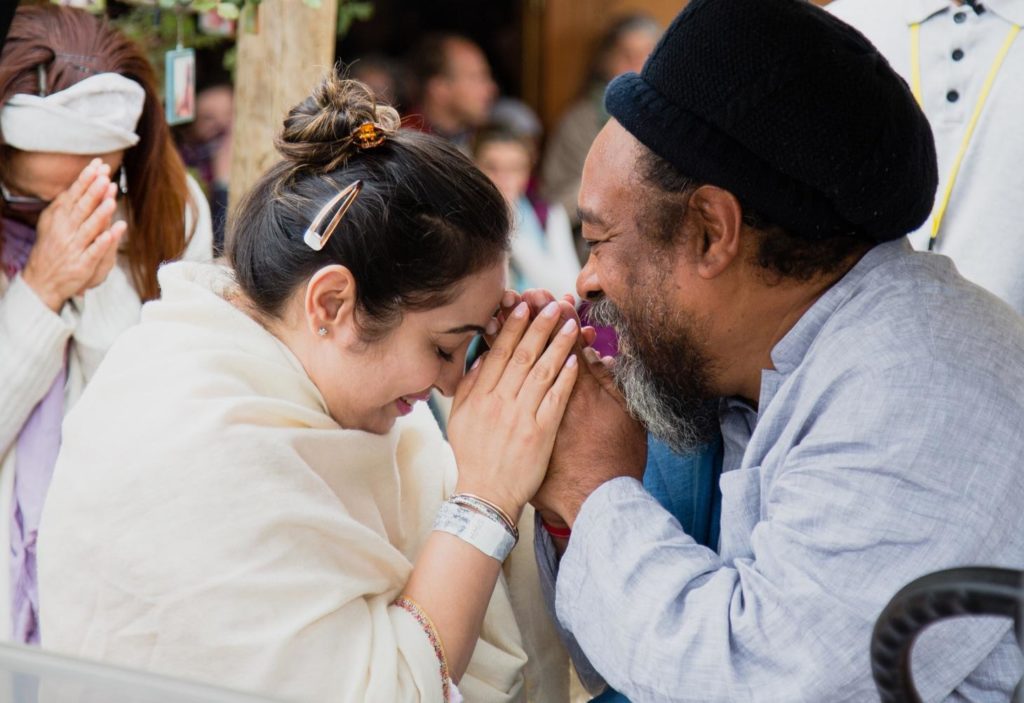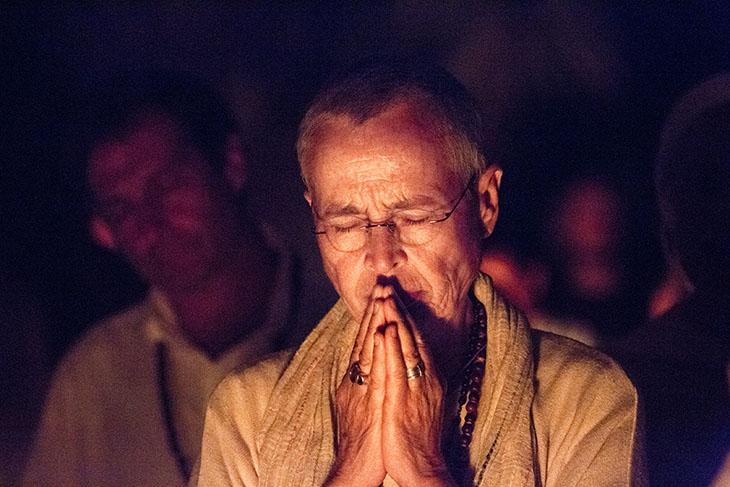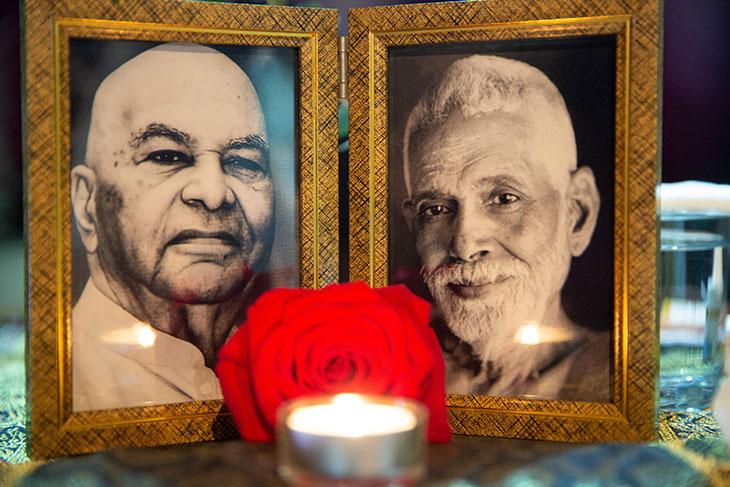
Why do some people refer to Mooji as a teacher, while others call him a master or a guru? Is he a guru?
It is not required or asked that anyone refers to Mooji in any particular way. Depending on their background, someone who follows Mooji’s guidance may choose to refer to him as a teacher, master or guru, or to use none of these. Mooji encourages everyone to be natural with him at all times and everyone is free to refer to him how they feel most comfortable.
The title of ‘guru’ may evoke a sense of uneasiness for some people, while for others it is the most natural, especially if they come from a culture where this is commonplace. The word ‘guru’ means ‘remover of darkness or ignorance’, and some find it the most appropriate description based on their own experience.
Regardless of the designation, Mooji is entirely dedicated to pointing everyone who comes to him sincerely for guidance to their own true nature. In doing this, he asks us not to simply believe him, but to apply his guidance until we can confirm for ourselves the Truth through the authority of our experiential seeing or knowing. In this way, lasting freedom and its inherent joy can be discovered and confirmed as synonymous with our Self.
I am most comfortable when I consider myself to be nothing. I am nothing, because nothing of ‘me’ I can have or keep. I’m only apparent in my physical manifestation, my phenomenal expression that comes through this body. I am just one small facet among infinite facets of the Supreme. Yet I am one with It timelessly as pure Consciousness. ~ Mooji

If devotional expression is not necessary, why is it allowed at all?
For some, devotion is an integral part of their spiritual journey and each one expresses it in their own way and in their own time according to their temperament. Devotion can be private and unspoken, simply a great gratitude felt in the heart, or an open sharing such as a bhajan (devotional song) or a poetic outpouring. It can also come as a heart-felt urge to touch their master’s feet, which is customary in many countries.
Mooji himself shares that after a powerful encounter with his master, Papaji, he initially experienced strong resistance within himself and wanted to run away. An hour or so later his entire being exploded in bliss and clarity and he came to recognise inside his heart that Papaji is his spiritual master. This led to an overwhelming urge to run to Papaji and fall at his feet in loving gratitude.
While devotional expression (touching feet, use of honorifics, emotional sharing etc.) towards Mooji is not required or expected in any way, it also feels inappropriate to him to turn away or deny all devotional expression when he sees and feels they come from the heart. Mooji welcomes people from all backgrounds and traditions, and also respects that different cultures have different ways of showing love, appreciation and gratitude. Depending on one’s cultural conditioning, devotional expression may be commonplace and perfectly natural, while for others it may seem unusual or off-putting—especially when it is viewed from the context of that person’s spiritual journey and background.
Some view devotional expression as lowering oneself or as worshipping Mooji or any master or teacher as an individual. However, what is generally misunderstood is that this is not the worship of an individual, but rather that it is an expression of pure love and gratitude to the Supreme Self, to the pure, timeless Truth that Mooji consistently points us to within ourselves. Mooji himself has shared many times that the highest form of gratitude is to earnestly follow his pointings until we awaken to the Truth for ourselves.

Does Mooji show more favour to those who show devotion than those who do not?
Where earnestness is recognised, Mooji sees and treat all with the same love, respect and attention. It is not required to behave in any particular way towards Mooji nor to regard him as one’s master in order to benefit fully from his clear and direct pointings to our real nature as pure, formless consciousness.
The master-disciple (or indeed teacher-student) relationship can take many forms and does not necessarily imply devotional expression, but where and when there arises profound recognition or awakening, a deep love and gratitude often flowers naturally inside the seeker’s heart towards the master. So, depending on one’s temperament and background, awakening to the Truth may indeed be beautifully infused with great love, trust, respect and devotion; or it may manifest as a powerful and unspeakable silence inside the student’s/seeker’s being. It may also be something entirely different and unique. The outcome of the master-student relationship is inscrutable and unpredictable.
Surely there is no need for devotion in modern times. Isn’t the ‘master-disciple’ dynamic a bit outdated?
While expressions of devotion are not expected or encouraged, we also acknowledge that there is a centuries old and continuing tradition of bhakti(devotion) as a genuine path to liberation. In some countries, certain devotional practices and traditions are highly honoured and valued, such as touching the feet of a loved one, respected family members, and especially touching the feet of one’s spiritual master or guru (‘guru’ means ‘remover of darkness or ignorance’).
Traditions like the annual celebration of Guru Purnima can seem alien to those unfamiliar with them, while for others they are a very natural expression of love and respect that have been a heart tradition for millennia. Some even feel that it is impossible to fully awaken to Truth through the master’s teachings, guidance and grace if the seeker has no love or deep respect for who or what the master truly is—the embodiment of the Self.
Some people see these traditional expressions of devotion as outdated, demeaning or taking advantage of the student / disciple, and suggest that they should be actively discouraged or stopped entirely, but this is simply not so. While Mooji and the Sangha frequently share that it is not necessary, required or expected to show devotion to him, especially if someone makes a show of it, it does not feel appropriate to categorically turn away or deny devotees from offering such expressions out of their love and respect, which in turn have arisen from their gratitude for their teacher’s guidance and grace.
For many people around the world, such expressions are commonplace and perfectly natural. Mooji himself has a great love and devotion to his own master, Papaji, who in turn showed great love and reverence to his master, Sri Ramana Maharshi. Far from being demeaning, for many people these expressions have and continue to carry a great beauty, humility, power and sacredness.
Perhaps it is useful to note that the word ‘master’ is sometimes misunderstood as the counterpart to ‘slave’. However, the counterpart is actually ‘disciple’, which simply means one who has come to learn from the teacher or master. And in this context ‘master’ means one who has great wisdom and insight, and the capacity to guide others to true and lasting self-discovery.

“The Guru is actually the polar star around which all things revolve.
He is the unmoving One, the core.
To live with your head at the master’s feet is to live on top of the world.
I discovered this at the feet of my own master, Papaji.
From here I can say with my full heart:
Enter the Guru’s boat, because it is through the boat of the Guru
that you will sail across the ocean of samsara.
And samsara is really a life of sorrow, of suffering, dream and confusion.
Initially, all beings are in this ocean of samsara
until they awaken to the true Guru within themselves.
The real Guru is actually our own inmost truth and Self.
But while we remain under the spell of ignorance,
the spell and hypnosis of personal conditioning,
false beliefs and arrogance, we continue sleeping to the Truth.
Therefore, as long as we continue believing we are a personal self only
this profound Truth is hidden from us by the veil of ignorance.
Satsang invites all beings to enter into this beautiful relationship
which will not end in a relationship but will truly guide you Home
by revealing your completeness as the one true Self.
This is the Guru’s true work:
To guide you back to your original nature
as perfect unity, timeless existence, unborn Awareness.
Remember this.”
~ Mooji

